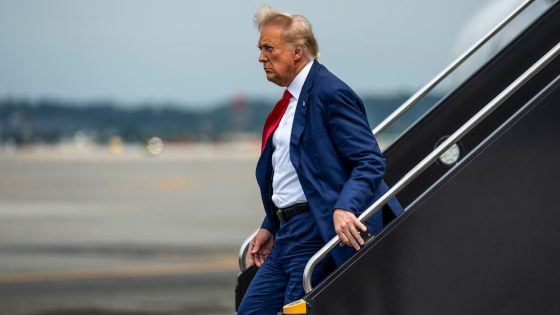Donald J. Trump flew into Washington last summer in a state of misery. He was there for his criminal arraignment, and he told associates afterward that the city was disgusting. He could feel Washington’s hostility, aides said.
Today, he returns to the nation’s capital under much different circumstances — to flex his dominance over a political and business establishment that has been forced to come to terms with him.
The former president is now the Republicans’ presumptive presidential nominee against President Biden, after vanquishing several primary rivals, raising hundreds of millions of dollars in recent months and rallying a wide range of Republicans behind him in denouncing his recent criminal conviction in Manhattan as evidence of a weaponized justice system.
Mr. Trump’s scheduled meetings with lawmakers — including Senator Mitch McConnell, the Republican leader who denounced him on the Senate floor weeks after the violent attack on the Capitol by a pro-Trump mob on Jan. 6, 2021 — are the starkest examples of how an establishment that still hates him has accepted his potential return to office. After years of hoping that someone else could step up to lead their party, that establishment is gradually submitting to the reality of the 2024 campaign.
“There’s high anticipation here and great excitement,” Speaker Mike Johnson told reporters on Wednesday before Mr. Trump’s visit.
The former president’s morning will begin with an early meeting with a group of House members, followed by a visit with dozens of chief executives who belong to the prestigious Business Roundtable. In the afternoon, he will visit with senators at a meeting organized by Senator John Barrasso of Wyoming, a close ally who, in January, became the highest-ranking senator to endorse Mr. Trump’s candidacy.
The agenda for the meetings is not entirely clear; a campaign official said the meetings with lawmakers would be focused on policy, on issues including the migrant crisis. One lawmaker planning to attend, who was not authorized to discuss the meetings, said no agenda was apparent other than Mr. Trump seeking to generate enthusiasm.
Republican House members have been his most loyal supporters in Washington for many years, particularly as his endorsements have helped shape the makeup of the G.O.P. conference by vaulting Trump-aligned aspirants through primaries.
But the meeting with senators, who as a group have been less responsive to Mr. Trump’s demands over time, will be the first time that Mr. Trump has been in the same room as Mr. McConnell since 2020, when the former president was seeking re-election and then, ultimately, trying to enlist lawmakers to help him stay in power.
Mr. Trump’s repeated claims of widespread voter fraud in battleground states like Georgia were widely seen as depressing turnout in two Senate runoffs, costing Republicans the majority.
A day after those runoffs, the pro-Trump mob stormed the Capitol in a deadly siege aimed at preventing certification of Mr. Biden’s Electoral College victory. Mr. McConnell condemned Mr. Trump’s actions and declared him responsible.
But he also did not vote to convict in Mr. Trump’s impeachment trial afterward, the departing president’s second such trial, saying it was the wrong forum for an out-of-office president. The decision of Mr. McConnell and other Senate Republicans to acquit would prove fateful, ultimately enabling Mr. Trump’s improbable comeback. A conviction would have barred him from office.
“We have a criminal justice system in this country,” Mr. McConnell said in his speech after the Senate trial. “We have civil litigation. And former presidents are not immune from being held accountable by either one. I believe the Senate was right not to grab power the Constitution does not give us.”
Since then, Mr. Trump has been indicted four times and convicted in what is likely to be the only trial to take place before Election Day. But Mr. McConnell, for whom retaking control of the Senate is a paramount issue, had said long before Mr. Trump became a candidate for a third time that he would back his party’s nominee, even if it was Mr. Trump.
Defying the expectations of Mr. McConnell and many others, Mr. Trump did not disappear. He turned his Mar-a-Lago club in Florida into a G.O.P. Mecca where would-be candidates would have to visit to plead for his endorsement. He crushed the man many thought would succeed him, Gov. Ron DeSantis of Florida, and went on to win nearly every primary and caucus he ran in, gaining strength in Republican primary polling after his indictments.
For the most part, those indictments have helped Mr. Trump politically. They spurred charges of a two-tiered justice system by Mr. Trump’s allies, including a number of Capitol Hill lawmakers who have said Republicans need to use tools of the criminal justice system to prosecute Mr. Trump’s prosecutors and a wide range of Democrats.
Between the House and Senate meetings, Mr. Trump will be hosted by the Business Roundtable, whose members include chief executives like Tim Cook of Apple and Jamie Dimon of JPMorgan Chase.
Most of corporate America had turned its back on Mr. Trump after the violence on Jan. 6. But as he has risen in the polls, and as a number of business leaders have grown disillusioned with Mr. Biden and as the Trump tax cuts are set to expire in 2025, a number have come around to either supporting Mr. Trump or being receptive to his pitch for a second administration.
Mr. Trump and his campaign team have been eager to recruit them as donors, and in recent weeks many business leaders have indicated privately that they’re coming on board.
Source Agencies


